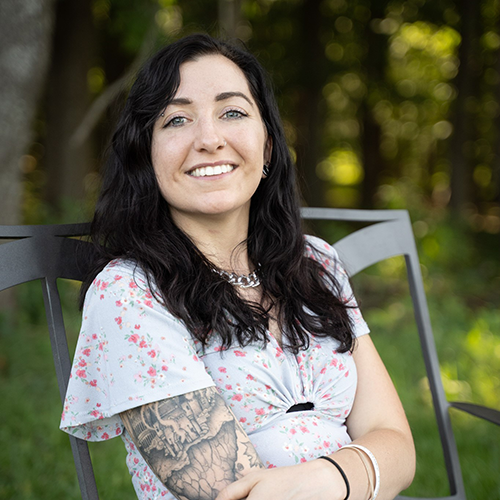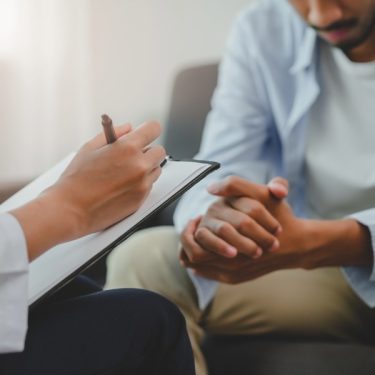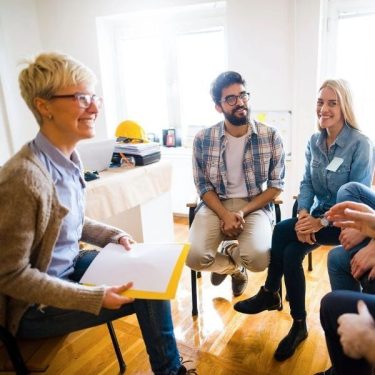Content warning: This blog posts includes mentions of self-injury, eating disorders and suicidal thoughts.
Sometimes the best things for you happen in the most unexpected ways. Just ask Kayla Blasher, a client success manager for Mental Health First Aid (MHFA), an evidence-based course from the National Council that teaches participants about mental health and substance use challenges. We sat down with Kayla to learn about her recovery journey and the importance of speaking up when people need help.
Your path to recovery began in high school. What was the catalyst?
“I remember it was my senior year. I was in the middle of a quiz when I was called into the guidance counselor’s office. There were two adults waiting for me: my counselor, who I was familiar with, and another counselor. I assumed they had called me in due to a drop in my grades, but they reassured me that wasn’t the case. Instead, they informed me that another student had reported their suspicion that I was engaging in self-injury. My chest and stomach tightened. It was true, but I had been hiding it for about four years and never told anyone.
“To deter any suspicion, I told the counselors I had stopped. It was mostly a lie. The other counselor asked me to roll up my sleeves for proof. I obliged, only because I knew there wouldn’t be evidence there. Afterward, my counselor gave me a business card to the local crisis intervention center and mentioned my parents would be notified. On top of self-injury, I also engaged in disordered eating behaviors and had occasional thoughts of suicide. Although I left feeling frustrated and scared, it was also the first time I had really become aware of the severity of my self-harming behaviors.”
How did that experience jumpstart your recovery journey?
“I always knew I wanted to pursue a degree and career in mental health, since I enjoyed learning about peoples’ journeys and supporting them through hardships. But after that experience, I realized I needed to do the same for myself. I needed to acknowledge my experiences, have self-compassion and nurture myself in order to recover. Before realizing that someone cared about me enough to take action, I didn’t want to seek help because I hadn’t acknowledged that I needed to. In a lot of ways, that moment put me on a path toward helping myself and others.”
What brought you to the National Council for Mental Wellbeing?
“The summer after earning my undergraduate degree, I interned with a crisis intervention team, where I had my first exposure to Mental Health First Aid. This inspired me to later serve as a youth suicide prevention coordinator for a local government health department. While in that role, I was selected to be trained as an Instructor in Youth MHFA, which teaches parents, family members, school staff and other caring citizens how to help an adolescent who is experiencing a mental health or substance use challenge. During training, I learned the National Council was going to pursue teen MHFA (tMHFA), and I wanted to be a part of that. When the program was being piloted in the U.S., I applied to join the National Council and support the launch. That was May of 2020, and I’ve been supporting tMHFA with passion and dedication ever since.”
How does tMHFA help teens with their mental wellbeing?
“Showing support and showing up for teens is critical for their mental wellbeing. According to the CDC’s 2021 Youth Risk Behavior Survey, more than four in 10 students felt persistently sad or hopeless, and nearly one-third experienced poor mental health. tMHFA teaches teens how to identify, understand and respond to signs of mental health and substance use challenges among their friends and peers. A key component of the training is knowing when to get assistance from a trusted adult — like what that student did on my behalf in high school. That knowledge gives learners the skills needed to provide support for others, connect them with resources or professionals and potentially save lives.”
Looking back, how did that moment in high school shape you?
“Because someone had expressed concern about my physical and mental wellbeing, I was able to acknowledge the impact of my mental health challenges and behaviors, eventually taking the step to seek help from a mental health professional. I learned that while I thought self-injury provided relief for my emotional pain, it was only a temporary relief. The healing journey and practice of healthy coping mechanisms that came with my recovery was sustaining. I try to instill that in the work I do at the National Council. I want people to know that hope, support and recovery are accessible.”
If you could, what would you say to that individual who helped you?
“To this day, I still do not know who had expressed concern, but I am so glad they spoke up; that they were so concerned for my wellbeing, they sought the support of a responsible adult. I constantly consider the empathy and compassion of that individual, and I wish I could thank them. I wish I could express my gratitude for their kindness. Working for MHFA now, I get to help others be that person for someone experiencing a mental health challenge. That moment in high school encouraged me to pursue a path of recovery not only for myself, but for others. I’m grateful that my experience and support from others has led me to recovery and the work I do today.”
To learn more about how to identify, understand and respond to signs of mental health and substance use challenges in others, find a MHFA training in your community.
For tools to help support recovery in your community, visit our National Recovery Month 2023 resource directory.




